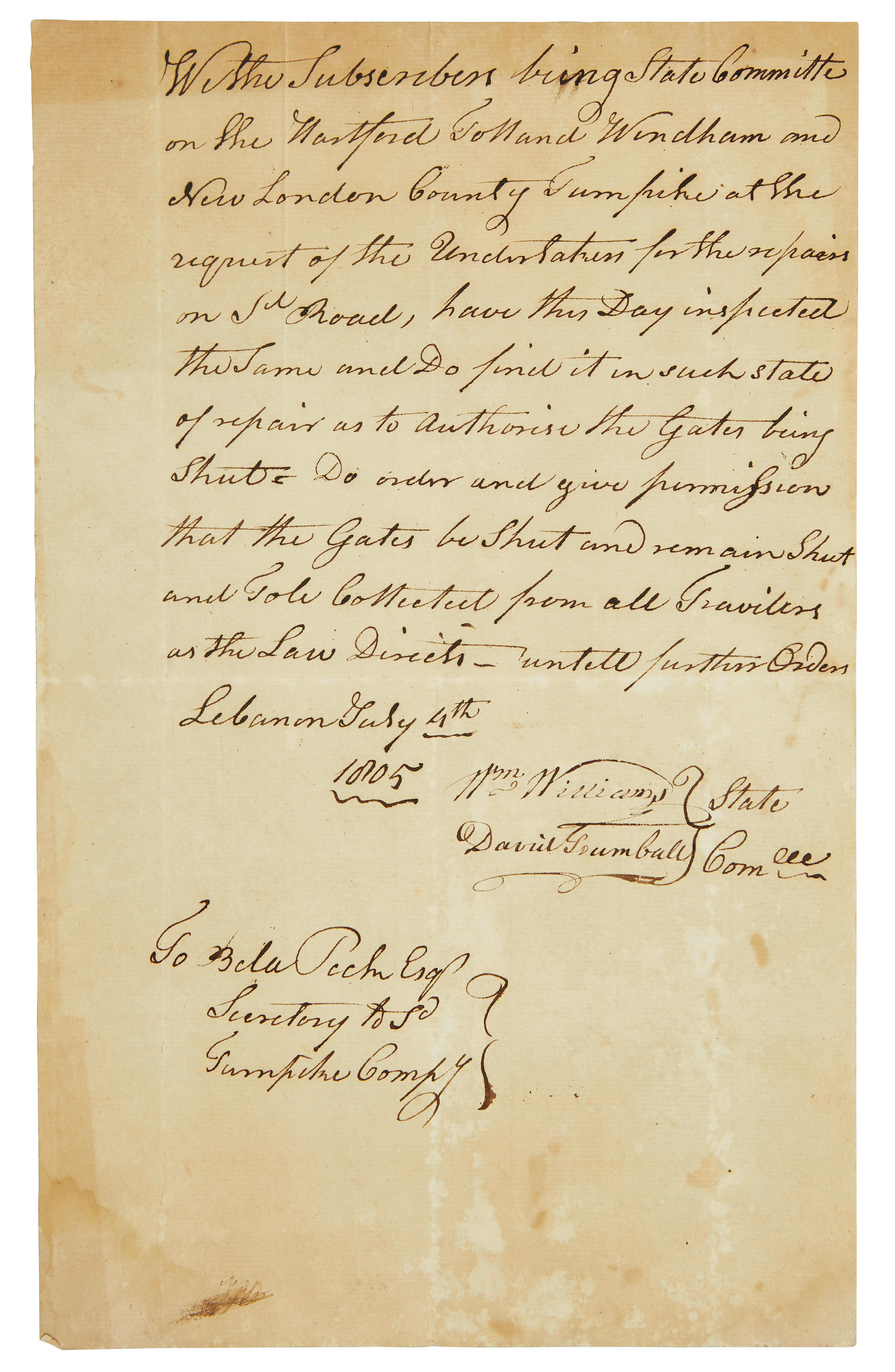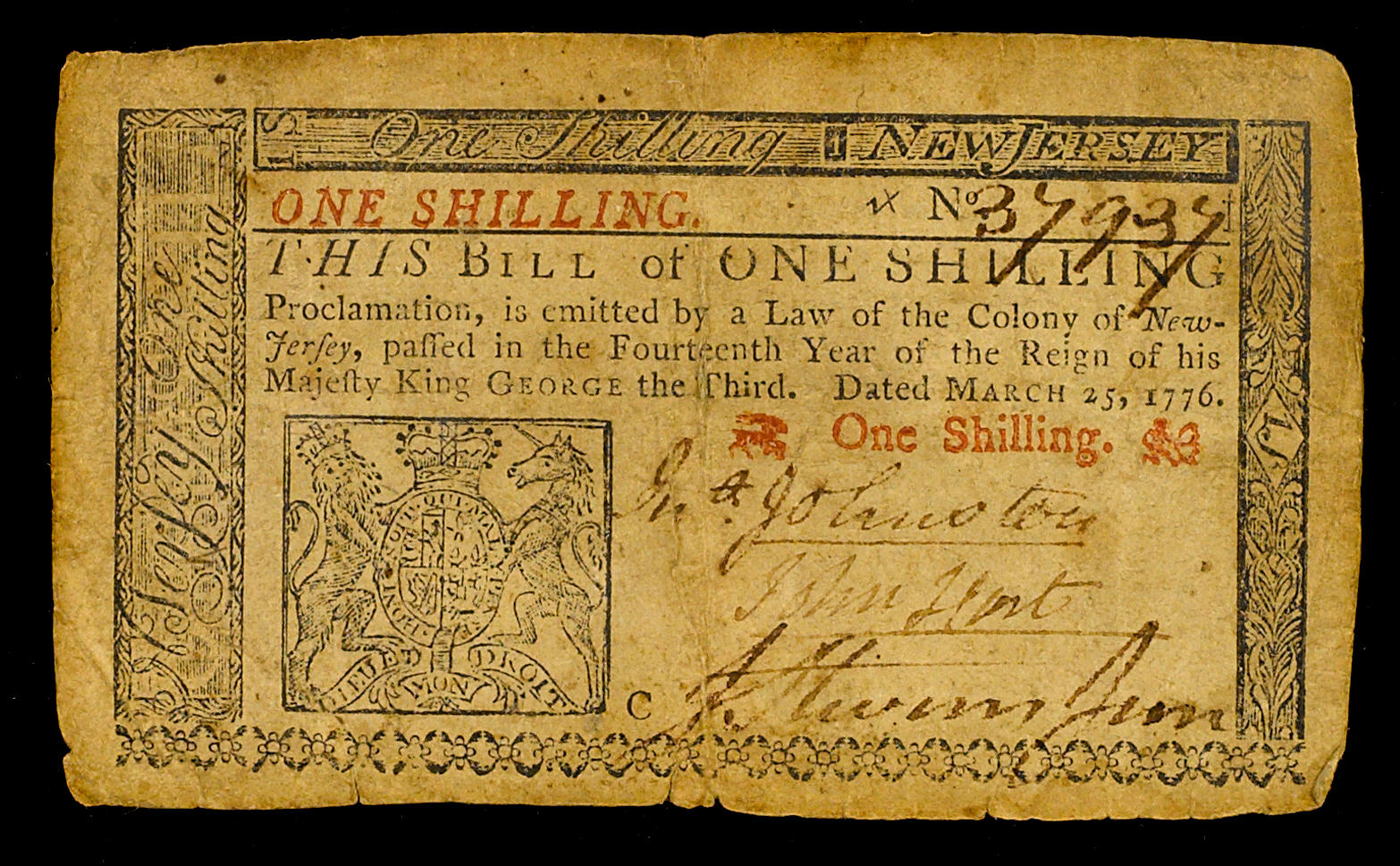Lot of 6 autographs of signers of the Declaration of Independence, including: James Smith (1719-1806), manuscript DS, 3.25 x 8 in., ensilked, undated, regarding a divorce. Robert Morris (1734-1806), partially-printed DS, 4 x 7 in., dated at Philadelphia, June 10, 1795, promissing to pay Robert Morris $6,000 in three years, signed boldly on verso. Francis Lightfoot Lee (1734-1797), clipped signature, approx. 3 x 3.25 in. Edward Rutledge (1749-1800), clipped signature from partially-printed document, 2 x 6.5 in., dated March 1784. John Penn (1741-1788), manuscript DS, 4.5 x 7.5 in., dated at Granville County (NC) courthouse, Feb. 6, 1786, summoning a man to court, initialed J.P. on verso. William Livingston (1723-1790), manuscript DS, 4 x 7.75 in., dated at Trenton, 20 May 1785, paying a man for serving as a court clerk. James Smith (1719-1806) delivered a paper he wrote entitled, "Essay on the Constitutional Power of Great Britain over the Colonies in America," in 1774 at a provincial assembly. He advocated for the boycott of British goods and a General Congress of the colonies to discuss and defend colonial rights. He then organized a volunteer militia company in York, of which he was elected Captain. he was later appointed to the provincial convention in Philadelphia in 1775, the State Constitutional Convention in 1776, and the Continental Congress later that year. Robert Morris (1734-1806) was a wealthy and influential Pennsylvanian during the Revolutionary Period. As such, he was elected to the Continental Congress in 1775, and given a special commission in 1776 to negotiate bills of exchange and solicit funds for the operations of war. In that same year, he even loaned $10,000 of his own private funds to the government due to a shortage in funding for the Continental Army. He established what would become the Bank of North America, which helped solidify the financial standing of the young nation, and he was sent as a delegate to the Constitutional Convention in 1787, where he advocated for and signed the new Constitution. George Washington actually appointed Morris Secretary of the Treasury in 1789, but he turned the offer down, suggesting Alexander Hamilton in his stead. Morris never regained the financial standing he enjoyed before the Revolutionary War, and died in relative poverty. Francis Lightfoot Lee (1734-1797) was elected to the Virginia House of Burgesses in 1765, and heavily opposed the Stamp Act with Patrick Henry. He attended the Virginia Convention in 1774, and was sent to the First Continental Congress later that year. Edward Rutledge (1749-1800) first attended Congress at age 27, but his main focus during the Revolutionary Period was defending his colony. In 1776 he took leave of Congress to defend South Carolina in the Charleston Battalion of Artillery, and was later promoted to the rank of Captain. He went back to Congress from 1779-1780, but was again needed on the battlefield as the British commenced their third invasion of South Carolina. He was actually captured and held as a prisoner until July 1781. He served in the state legislature of South Caroline from 1782-1796, where he played a major role in prosecuting British Loyalists. Rutledge was eventually elected Governor of South Carolina in 1789. John Penn (1741-1788) established his own law practice in Granville County, North Carolina in 1774, and was elected to attend the Continental Congress in the following year. He continued serving his colony, and later the young nation, as he participated in committee work and served on the Board of War until 1780. William Livingston (1723-1790) had a long political career, even founding a weekly journal called the Independent Reflector in 1752. His political career started in earnest after he moved to New Jersey, and was elected a delegate to the Continental Congress in 1774. The next year he was commissioned as brigadier general of the New Jersey Militia, and was elected Governor of New Jersey in 1776, an of
Lot of 6 autographs of signers of the Declaration of Independence, including: James Smith (1719-1806), manuscript DS, 3.25 x 8 in., ensilked, undated, regarding a divorce. Robert Morris (1734-1806), partially-printed DS, 4 x 7 in., dated at Philadelphia, June 10, 1795, promissing to pay Robert Morris $6,000 in three years, signed boldly on verso. Francis Lightfoot Lee (1734-1797), clipped signature, approx. 3 x 3.25 in. Edward Rutledge (1749-1800), clipped signature from partially-printed document, 2 x 6.5 in., dated March 1784. John Penn (1741-1788), manuscript DS, 4.5 x 7.5 in., dated at Granville County (NC) courthouse, Feb. 6, 1786, summoning a man to court, initialed J.P. on verso. William Livingston (1723-1790), manuscript DS, 4 x 7.75 in., dated at Trenton, 20 May 1785, paying a man for serving as a court clerk. James Smith (1719-1806) delivered a paper he wrote entitled, "Essay on the Constitutional Power of Great Britain over the Colonies in America," in 1774 at a provincial assembly. He advocated for the boycott of British goods and a General Congress of the colonies to discuss and defend colonial rights. He then organized a volunteer militia company in York, of which he was elected Captain. he was later appointed to the provincial convention in Philadelphia in 1775, the State Constitutional Convention in 1776, and the Continental Congress later that year. Robert Morris (1734-1806) was a wealthy and influential Pennsylvanian during the Revolutionary Period. As such, he was elected to the Continental Congress in 1775, and given a special commission in 1776 to negotiate bills of exchange and solicit funds for the operations of war. In that same year, he even loaned $10,000 of his own private funds to the government due to a shortage in funding for the Continental Army. He established what would become the Bank of North America, which helped solidify the financial standing of the young nation, and he was sent as a delegate to the Constitutional Convention in 1787, where he advocated for and signed the new Constitution. George Washington actually appointed Morris Secretary of the Treasury in 1789, but he turned the offer down, suggesting Alexander Hamilton in his stead. Morris never regained the financial standing he enjoyed before the Revolutionary War, and died in relative poverty. Francis Lightfoot Lee (1734-1797) was elected to the Virginia House of Burgesses in 1765, and heavily opposed the Stamp Act with Patrick Henry. He attended the Virginia Convention in 1774, and was sent to the First Continental Congress later that year. Edward Rutledge (1749-1800) first attended Congress at age 27, but his main focus during the Revolutionary Period was defending his colony. In 1776 he took leave of Congress to defend South Carolina in the Charleston Battalion of Artillery, and was later promoted to the rank of Captain. He went back to Congress from 1779-1780, but was again needed on the battlefield as the British commenced their third invasion of South Carolina. He was actually captured and held as a prisoner until July 1781. He served in the state legislature of South Caroline from 1782-1796, where he played a major role in prosecuting British Loyalists. Rutledge was eventually elected Governor of South Carolina in 1789. John Penn (1741-1788) established his own law practice in Granville County, North Carolina in 1774, and was elected to attend the Continental Congress in the following year. He continued serving his colony, and later the young nation, as he participated in committee work and served on the Board of War until 1780. William Livingston (1723-1790) had a long political career, even founding a weekly journal called the Independent Reflector in 1752. His political career started in earnest after he moved to New Jersey, and was elected a delegate to the Continental Congress in 1774. The next year he was commissioned as brigadier general of the New Jersey Militia, and was elected Governor of New Jersey in 1776, an of




.jpg)










Try LotSearch and its premium features for 7 days - without any costs!
Be notified automatically about new items in upcoming auctions.
Create an alert